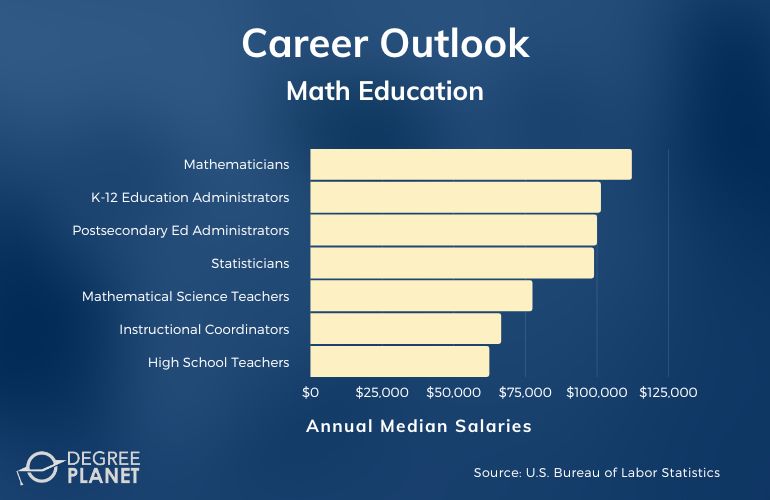If you’re passionate about math and teaching, then earning a masters in math education may be the next step in your educational journey.

Whether you’re interested in teaching a specific age range or creating math curriculums, this degree can help you develop your professional skills and qualifications in this field.
Editorial Listing ShortCode:
If you’re currently working and need flexible schooling options, then it could be strategic to choose an online math education degree program from an accredited school.
Online Masters in Math Education Programs

Online masters in math education programs are designed to provide the skills needed to pursue a career as a K-12 mathematics instructor, administrator, or curriculum developer.
Editorial Listing ShortCode:
While your course subjects can vary depending on your chosen grade-level specialization, common topics include teaching basic to advanced math equations and designing math learning programs.
You may also learn about:
- Teaching technologies and their integration in the classroom
- Mathematical problem solving techniques
- Statistics, data analysis, and research methodologies
- Leadership strategies for classrooms and administrative roles
- Lesson planning strategies
- Interpreting mathematical surveys and visual data
Your curriculum may also cover the different types of mathematics assessments at the local, state, and national level. You could also explore how assessments affect teaching and learning.
If you choose a middle or high school specialization, you may cover key topics like math modeling, linear and abstract algebra, probability, and calculus. If you don’t already hold a teaching license, you may also choose a license concentration, which could put you on the track to pursuing teaching licensure.
Graduates of this program may also choose to further their education in order to pursue research or academic positions at the university level.
Common Online Masters in Math Education Specializations

Most masters in math education online programs allow students to choose a specialization where they can focus on a particular grade level or a specific aspect of the field. These concentrations can include:
- Elementary Mathematics Education. This specialization focuses on preparing graduates for teaching mathematics to young learners at the elementary school level.
- Postsecondary Mathematics. This concentration helps prepare students to pursue the track of teaching mathematics at the postsecondary level.
- High School Mathematics Education. In this concentration, students focus on teaching strategies for secondary school students.
- Licensure Specialization. This concentration is for students looking to gain licensing in their desired state. The curriculum of this concentration often meets the licensing requirements of the state in which the school is located.
- Non-Licensure Specialization. This concentration does not lead to a teaching license, although many of the topics taught are the same as the licensure track. This concentration is typically designed for currently licensed math teachers who are looking to advance.
Schools may also offer concentrations in K-12 mathematics education, middle school mathematics education, and special education.
Math Education Careers & Salaries

Graduates of an online masters program in math education often enter teaching roles, administration roles, or educator research roles.
Math teachers who are already licensed may choose to earn a masters to advance into administrative roles or pursue research or academic positions. Students who desire to become licensed teachers and teach at the K-12 level may choose a masters program that leads to licensing so they can teach in their state.
According to the Bureau of Labor Statistics, here are the median salaries of potential career paths related to graduate studies in math education. Of course, individual salaries can vary depending on your state, level of experience, and the institution you’re working for.
| Careers | Annual Median Salaries |
| Mathematicians | $112,110 |
| K-12 Education Administrators | $101,320 |
| Postsecondary Education Administrators | $99,940 |
| Statisticians | $98,920 |
| Postsecondary Mathematical Science Teachers | $77,420 |
| Instructional Coordinators | $66,490 |
| High School Teachers | $62,360 |
| Middle School Teachers | $61,810 |
| Elementary School Teachers | $61,690 |
| Kindergarten Teachers | $60,490 |
Your chosen degree concentration and prior education may impact your job qualifications. Some of the common career paths of graduates with a masters in math education include mathematics teachers at the elementary, middle, or high school level.
Graduates may also become independent math tutors or even instructional coordinators who help design mathematics curriculums and teaching strategies. In addition, graduates may pursue teaching positions at community colleges.
Editorial Listing ShortCode:
Those with advanced mathematics training can even go on to become financial managers, mathematicians, or statisticians, working for government agencies or financial institutions.
Math Education Masters Curriculum & Courses

While curriculums can differ depending on your school and concentration, many core courses may be similar across programs. Below are some common courses you may take:
- Teaching Mathematics Through Problem Solving: This course overviews how to cultivate mathematical reasoning through thoughtful problem solving.
- Curriculum and Instruction in Mathematics Education: This course explores how teachers design lesson plans and examines standards-based instruction and its influence on the creation of curricula.
- Research Methods in Mathematics Education: This course overviews both historical and current research methods and analysis, covering both qualitative and quantitative methods.
- Technology for Mathematics Teachers: This course overviews current and emerging education technologies that can help teachers with modeling and computational exercises.
- Mathematics Learners and Learning: This course focuses on different learning styles and contexts, including cultural, social, developmental, and existing skills that impact how students learn mathematics.
- Mathematics History and Technology: This class delves into the history of mathematics and mathematical philosophies, encouraging students to view mathematics through a cultural, personal, and societal perspective.
- Statistics and Data Analysis: This course focuses on evaluating data-based claims using qualitative and quantitative data analysis techniques, including visual, verbal, and numerical strategies.
- Mathematics Education Assessments: This course overviews the various types of mathematical assessments utilized in classrooms and at national and international levels, and it also examines how assessment affects teaching strategy.
- Number Theory: This course focuses on composites, congruence, and primes alongside historical math theories.
- Diagnosis and Remediation of Learning Difficulties in Mathematics: This course overviews diagnostic and remediation procedures for learning disabilities, and it also covers learning strategies for students with learning difficulties.
Most programs also require students to complete a capstone, thesis, or applied professional experience project.
How to Choose an Online Masters in Mathematics Education Program

Here are several considerations to keep in mind to help you choose the online masters in math education program that’s best for you:
- Program format. Online masters in math education programs can be offered in synchronous and asynchronous formats. So, it is helpful to determine which one is best for your learning style as well as your schedule, especially if you are currently working as a teacher.
- Cost. It can be helpful to compare the cost of various programs, especially if you’re considering enrolling in an online program from an out-of-state school. You can also compare financial aid opportunities available at different schools.
- Location. As an online learner, you may be able to choose a school that is outside of your state. It’s strategic to determine whether you need to meet licensing requirements for the state you want to teach in. You can also see if you will need to attend any in-person sessions for your capstone or thesis project.
- Student support services. You might consider whether a prospective school provides access to mentorship or internship opportunities, as these can often be strategic stepping stones in your career path.
Keeping these considerations in mind may help you enroll in a program that best aligns with your needs, schedule, and interests.
Admissions Requirements

While admission requirements can vary depending on your school, here are some common criteria for applying to a masters degree online in mathematics education:
- Bachelors degree and official transcripts
- Letters of recommendation
- Resume or work experience
- Essay or personal statement
- GRE or GMAT scores (only required by some schools)
Many schools no longer require GRE or GMAT scores for graduate admissions, but you can check with your school to see if they request standardized test scores. Some programs require applicants to have relevant work experience or an active teaching license.
Accreditation

Your school’s accreditation status could impact not only your job qualifications but also your eligibility to receive financial aid for your graduate studies.
Regional accreditation is considered the most widely recognized accreditation. In essence, this accreditation status ensures a high standard of quality for postsecondary institutions, regardless if a school is online or on campus.
Editorial Listing ShortCode:
You can visit the Council for Higher Education Accreditation’s website to verify whether your school has been accredited by a regional accrediting organization.
Financial Aid and Scholarships

Most students pursuing a masters in math education online seek financial assistance to help cover the upfront costs of their program.
You might consider scholarship and grant opportunities. Both scholarships and grants are available for different types of majors and specific life situations. These may be offered by your school as well as by outside organizations.
Other financial aid options to consider are federal and state aid programs. Government aid is commonly given in the form of student loans, though the amount can vary based on your financial situation and location. To determine your eligibility for need-based aid, you can fill out the Free Application for Federal Student Aid (FAFSA).
You may also be able to seek out employer programs if you’re currently employed. Some workplaces provide tuition assistance to employees looking to further their education.
What Is a Masters in Math Education?

A masters in math education is a graduate degree that can help current math teachers advance their careers in mathematics education or even pursue leadership roles in their school.
This degree path could also be beneficial for professionals who want to move into the field of math education. This masters program trains students in advanced topics in teaching strategy, mathematical concepts, research methodologies, mathematical history and theory, and cultural considerations.
Depending on the program, a masters in math education may also help graduates become licensed to teach in their state. A masters can also help prepare students for teaching at the postsecondary level, although additional education may be required for university positions.
What Can You Do with a Masters in Math Education?

Earning a masters in math education can help you advance your career as a math teacher in elementary school, middle school, high school, or even postsecondary schools. Many educators may also complete this degree in order to advance their teaching career into leadership or administrative roles at their school.
Other graduates use this masters as stepping stone into research or academic positions. Some math education professionals become instructional coordinators who develop curriculum and teaching strategies, while others may even become independent math tutors.
How Long Does It Take to Get a Master’s in Math Education Online?

Most masters programs can be completed in 1 to 2 years with full-time study. The time it takes to complete a masters in math education program online depends on your program and enrollment status.
Editorial Listing ShortCode:
Generally, a 36 credit hour program with no thesis requirement can be completed in 1 year with full-time, year-round enrollment, which includes summer enrollment. Many masters in math education programs do require a thesis, which could extend your time to completion. Enrolling part-time could lengthen your time to completion as well.
What’s the Difference Between an MA vs. MEd in Math Education?

While a Master of Arts (MA) and a Master of Education (MEd) in Math Education may seem similar, these degrees have slightly different focuses.
- MA in Math Education: This degree path is more academic focused, emphasizing theory and research methodology.
- MEd in Math Education: This degree path is more practice oriented, focusing more on classroom-ready skills and teaching methods.
Both of these programs train students to become math educators, but an MA is more research focused for those who are considering a career in research or academia.
Is a Masters Degree in Math Education Worth It?

Yes, a masters degree in math education is worth it for many students. Pursuing a masters could help you increase your earning potential, and you could also learn how to better help the next generation of math students.
Editorial Listing ShortCode:
Earning this degree can help educators qualify for senior teaching or leadership roles, where they may have a greater impact on mathematics education. According to the Bureau of Labor Statistics, the overall employment of education, training, and library occupations is forecast to grow by 7% over the next ten years, which is on par with the average for all occupations.
Universities Offering Online Masters in Mathematics Education Degree Programs
Methodology: The following school list is in alphabetical order. To be included, a college or university must be regionally accredited and offer degree programs online or in a hybrid format.

American College of Education offers a Master of Education in Mathematics Education program online. The program is designed to prepare educators to teach mathematics at the secondary or college level using a discovery model. On average, students complete the 34 required credit hours in as few as 16 months of full-time attendance.
American College of Education is accredited by the Higher Learning Commission.

Ball State University offers an online program for a Master of Arts in Mathematics Education. Specializations include Elementary and Middle School Teachers, Secondary School Teachers, or Elementary and Middle School Specialists. The program requires the completion of 30 to 32 credit hours depending on the chosen concentration.
Ball State is accredited by the Higher Learning Commission.

Drexel University offers an online program for a Master of Science in Mathematics Learning and Teaching. Potential classes include Evidence-Based Evaluation, Function Through the Curriculum, Diagnosing Student Mathematical Thinking, and Problem Solving Strategies. At least 45 credit hours must be completed in order to graduate.
Drexel University is accredited by the Middle States Commission on Higher Education.

East Carolina University offers a hybrid program for a Master of Arts in Education with a concentration in Mathematics Education. Emphases include Elementary Education, Middle School Education, and High School Education. The curriculum consists of 36 credit hours, and most classes are attended part time.
East Carolina University is accredited by the Southern Association of Colleges and Schools Commission on Colleges.

Florida State University offers an online program for a Master of Science in Curriculum and Instruction with a concentration in Mathematics Education. The program is an advanced degree for certified educators who are interested in career advancement. The program requires the completion of 30 credits and typically culminates in a final portfolio.
Florida State University is accredited by the Commission on Colleges of the Southern Association of Colleges and Schools.

Harvard University offers an online program for a Master of Liberal Arts in Extension Studies with a specialization in Mathematics for Teaching. Elective certificates like Math Leadership or Learning Design and Technology allow for tailoring the degree to professional goals and interests. The program requires the completion of 12 courses.
Harvard University is accredited by the New England Commission of Higher Education.

Indiana Wesleyan University offers a Master of Science in Mathematics in Education program online. Potential courses include Linear Algebra, Abstract Algebra, Advanced Calculus, Real Analysis, and Statistical Methods.
The program requires the completion of 33 credits. The program is designed to help prepare for entry into careers such as PK to 12 mathematics teacher, community college mathematics instructor, or mathematics specialist.
Indiana Wesleyan University is accredited by the Higher Learning Commission.

James Madison University offers an M.Ed. in Mathematics program online. The program aims to provide high school mathematics teachers with advanced knowledge of mathematics, education theory, and teaching methodology. The content of the program aligns with the recommendations of the Mathematical Education of Teachers’ Report of Mathematical Sciences. The completion of 34 credits is required.
James Madison University is accredited by the Southern Association of Colleges and Schools Commission on Colleges.

Kansas State University offers an online program for a Master of Science in Curriculum and Instruction with a specialization in Mathematics Education. The program is designed to help prepare educators to teach mathematics in K to 12 settings. Potential courses include Advanced Methods for Teaching Math, Assessment in Mathematics Education, Multicultural Issues in Teaching, and Instructional Systems Design.
Kansas State University is accredited by the Higher Learning Commission.

Lesley University offers a Master of Education in Mathematics program online. A choice of a professional licensure track or non-licensure track must be made depending on past educational experiences, certification level, and professional goals. The program requires the completion of 33 credit hours. Classes are typically 8 weeks long each.
Lesley University is accredited by the New England Commission of Higher Education.

North Carolina State University offers an online program for a master’s degree in STEM Education. The degree can be earned as a Master of Education or Master of Science depending on career goals. The program admits 3 times each year, for spring, summer, or fall terms.
North Carolina State University is accredited by the Southern Association of Colleges and Schools Commission on Colleges.

Nova Southeastern University offers an online program for a Master of Science in Mathematics Education. Emphases include K to12 Mathematics Education and Postsecondary Mathematics Education. A bachelor’s degree must have already been earned with a 2.5 GPA or higher in order to be considered for admission to the program. The program requires the completion of 36 credit hours.
Nova Southeastern University is accredited by the Commission on Colleges of the Southern Association of Colleges and Schools.

Radford University offers an online program for a Master of Science in Education for Mathematics Education. Potential classes include Multicultural Perspectives, Mathematical Analysis and Modeling, and Issues of Equity and Diversity in Mathematics Education.
Classes are typically taught synchronously in fall and spring and asynchronously during summer terms. The completion of the 18 required credits may be accomplished in 12 months.
Radford University is accredited by the Southern Association of Colleges and Schools Commission on Colleges.

Shawnee State University offers a Master of Science in Mathematics program online. The program is designed for high school mathematics teachers seeking career advancement or for preparing for a doctoral degree in mathematics. Classes are typically 7 weeks long each. Up to 9 of the 36 required credits may be transferred in from accredited outside institutions.
Shawnee State University is accredited by the Higher Learning Commission.

The State University of New York–Brockport offers an online program for a Master of Science in Mathematics Education. Concentrations include Education Inclusive Generalist Grades 5-12 and Adolescence Mathematics Grades 7-12. Depending on the chosen specialization, classes may be attended fully online or using a hybrid online and face-to-face learning model. Admissions are generally offered 3 times each year.
SUNY Brockport is accredited by the Middle States Commission on Higher Education.

The University at Buffalo offers an MEd in Math Education Studies. The program’s online format and part-time attendance model is designed to accommodate the schedules of busy working teachers. The curriculum requires the completion of 33 credit hours. On average, the required coursework may be completed in about 4 or 5 semesters.
The University at Buffalo is accredited by the Middle States Commission on Higher Education.

The University of Houston offers a Master of Education in Curriculum and Instruction program online with a specialization in Mathematics Education. Classes usually meet synchronously online in the evenings. The program is typically completed in 2 to 3 years of full-time study.
The University of Houston is accredited by the Southern Association of Colleges and Schools Commission on Colleges.

The University of Maine–Farmington offers an online program for a Master of Science in Education with a concentration in Mathematics Education. Classes utilize a blend of online and face-to-face delivery. The Leadership track is designed for licensed teachers, while the Initial Licensure track prepares new teachers to pursue certification. The program requires the completion of 33 credits.
The University of Maine at Farmington is accredited by the New England Commission of Higher Education.

The University of Missouri–Columbia offers an online program for a Master of Education in Mathematics Learning, Teaching, and Curriculum. Potential classes include Curriculum Development, Contemporary Equity Issues in Mathematics Education, and Technology and Mathematics Education. The program requires the completion of 30 credit hours, and on average, is finished in 2 years.
The University of Missouri – Columbia is accredited by the Higher Learning Commission.

Western Governors University offers a Master of Arts in Mathematics Education program online. The program is designed to help prepare for careers as middle or high school teachers, curriculum specialists, or instructional designers. With full-time attendance, the program may be completed in 24 months.
Western Governors University is accredited by the Northwest Commission on Colleges and Universities.
Getting Your Masters in Mathematics Education Online

Getting a masters in math education online is a convenient way for teaching professionals to earn an advanced degree while continuing their career.
Earning a masters in mathematics education could help increase your earning potential and expand your career opportunities. Some graduates advance into leadership or administrative positions, while others pursue roles in curriculum development and education research. Others continue teaching math at K-12 or postsecondary schools.
Overall, if you’re passionate about mathematics and teaching, you might consider furthering your professional qualifications with a masters degree in math education. Why not start exploring online programs from accredited schools today?

